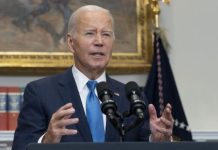
Feb. 4 (UPI) — Centers for Disease Control and Prevention officials on Monday revealed that the total number of confirmed cases of 2019 novel coronavirus in the United States has risen to 11.
The new cases include a Massachusetts resident and four Californians. Four of the five had traveled to Wuhan, China — epicenter for the outbreak of the virus, known as 2019-nCoV — while the fifth involved a “close contact” with one of the travelers.
That last case is the second involving person-to-person transmission that has been confirmed in the United States, officials.
So far, 167 Americans who have undergone screening for the virus have tested negative, while results are pending on an additional 82, Dr. Nancy Messonnier, director of the CDC’s National Center for Immunization and Respiratory Disease, said at a press briefing.
Although Messonnier noted that the 11 confirmed cases are being monitored by public health officials in the affected states, she said reports to the CDC so far have suggested that “a few of them” are suffering from “mild illness,” while others have more severe disease.
“There have been ups and downs in the courses” of a few of these patients, and “some have required oxygen,” she added.
Nearly 20 students at Princeton University who recently traveled to China were asked to self-isolate for 14 days, remain indoors and not attend classes or campus jobs, after guidance from the New Jersey Department of Health.
“Each student’s needs are being evaluated on a case-by-case basis to ensure they receive appropriate assistance,” deputy university spokesman Michael Hotchkiss said.
Chinese Foreign Ministry spokesperson Hua Chunying said China’s efforts to fight the virus have been affirmed by the World Health Organization and that China has “noted” U.S. offers to provide assistance.
“The United States should adopt an objective, impartial, calm and rational attitude, refrain from overreacting, respect and cooperate with China’s prevention and control efforts and work with China and the international community to combat the new crown pneumonia epidemic,” Hua said.
On Monday, Messonnier also responded to criticism from leaders in China and from the WHO — both of which have called into question the merits of measures the U.S. government put into place over the weekend. The moves included restricting travel to and from China and implementing mandatory quarantining for some foreign travelers coming into the country.
She emphasized that the government’s response has been “science-based,” while acknowledging that this is an “unprecedented situation and because it is moving so quickly, we don’t have the information base we want.” She added that the U.S. is taking “aggressive measures. We are preparing as if this is the next pandemic. We hope that strong measures now may blunt the impact on the United States.”
The primary concern of health officials at this point is emerging data suggesting that those sickened with 2019-nCoV may be able to pass along the virus to others even before they experience symptoms themselves.
Screening of travelers from mainland China continues at 11 U.S. airports this week, and quarantine measures for each are still being determined, the CDC said. Quarantined travelers could be housed at military bases, like those 195 Americans evacuated last week from Hubei province in China, or at hospitals or even hotels.
Messonnier said the CDC and other agencies are also “putting a lot of resources into finding new infections” both here and abroad. She noted that the virus has been isolated, and samples have been forwarded to the National Institutes of Health to further research efforts into potential vaccines and drug treatments.
The CDC has also developed an RRT-PCR test that can successfully diagnose 2019-nCoV, and it has applied for an emergency use authorization from the Food and Drug Administration so that the protocol can be distributed to laboratories in the 50 states as well as the agency’s international partners.
Although the test is accurate, Messonnier said, people who may have tested negatively on initial screening could still get sick, because the virus may remain undetectable for a time following transmission. As a result, those placed in quarantine may need to be tested multiple times.





